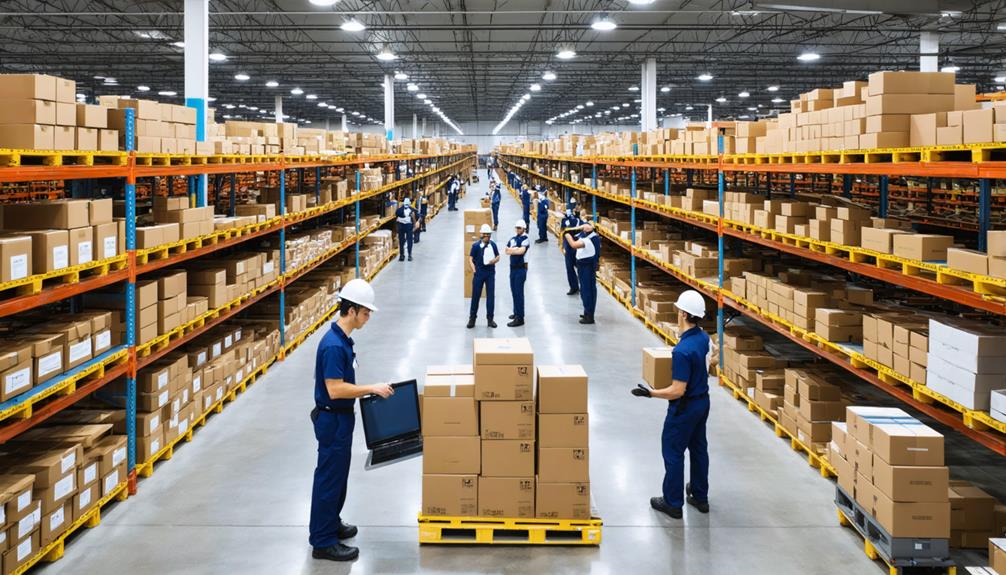
Brainstorm Security Shop

For Orders Over $99

On Any Of Our Products

Details On Refund Page

In the intricate world of security products distribution, these entities are pivotal in bridging the gap between innovative manufacturers and the diverse needs of end-users. By offering an extensive array of solutions—from advanced surveillance systems to cutting-edge cybersecurity tools—distributors not only meet the growing safety demands but also provide the expertise essential for navigating a rapidly changing market. As digital transformation and sustainability redefine industry norms, the question remains: how will these distributors continue to adapt and thrive amidst the challenges of inventory management and increasing competition?
Security products distributors play a crucial role in the supply chain by serving as the intermediary between manufacturers and end-users. They ensure that a variety of security products reach the market efficiently, meeting the demands of businesses and consumers alike.
Effective inventory management is at the heart of their operations, allowing distributors to maintain optimal stock levels, reducing lead times, and preventing overstock or stockouts. This precision in inventory management ensures that the right products are available at the right time, which is critical in an industry where security needs can be urgent and unpredictable.
Furthermore, maintaining strong supplier relationships is essential for distributors to perform their role effectively. By fostering robust partnerships with manufacturers, distributors can negotiate favorable terms, gain access to exclusive products, and stay informed about the latest technological advancements.
These relationships also facilitate better coordination and communication, ensuring a seamless flow of products from production to delivery. In turn, this enhances the distributor’s ability to provide timely and reliable service to their customers.
Through strategic inventory management and strong supplier relationships, security products distributors contribute significantly to the overall efficiency and effectiveness of the supply chain in the security industry.
Among the diverse offerings provided by distributors in the security sector, key products typically include surveillance systems, access control solutions, and alarm systems.
Surveillance cameras are at the forefront of security hardware, providing real-time monitoring capabilities essential for safeguarding properties. Modern surveillance systems often integrate advanced technologies, such as high-definition imaging and remote access, ensuring comprehensive coverage and ease of management.
Access control solutions are another vital component, enabling organizations to regulate entry to their premises effectively. These systems encompass a range of technologies, including traditional keycard access and sophisticated biometric scanners, which authenticate individuals based on unique physical characteristics. This enhances security by ensuring that only authorized personnel can enter sensitive areas.
Alarm systems remain a cornerstone of security, providing immediate alerts in case of unauthorized access or emergencies. These systems can be integrated with other security products to offer a cohesive response to potential threats.
In addition to physical security measures, cybersecurity software is increasingly critical in protecting digital assets from cyber threats. Security distributors offer comprehensive software solutions to guard against data breaches, ensuring that sensitive information remains secure.
Collectively, these products form a robust defense against a variety of security challenges.

Selecting the right distributor is a strategic decision that can significantly impact the effectiveness and integration of security solutions. The process of distributor selection involves evaluating potential partners based on their reliability, product range, and market expertise. An ideal distributor should not only supply the required products but also offer partnership benefits that align with the business goals, such as enhanced support, training, and market insights.
A structured approach to distributor selection can be summarized in the table below:
| Criterion | Description | Importance |
|---|---|---|
| Reliability | Consistent delivery and adherence to agreements | High |
| Product Range | Availability of a comprehensive suite of products | Medium |
| Market Expertise | Knowledge of industry trends and customer needs | High |
| Support Services | Post-sale support and technical assistance | Medium |
Selecting a distributor with a robust support infrastructure can lead to improved customer satisfaction and reduced downtime. Furthermore, a partnership that includes market expertise can offer competitive advantages, helping businesses stay ahead in a dynamic security landscape. Ultimately, the right distributor will provide a synergy that fosters growth and innovation, ensuring the security solutions are effectively deployed and managed. By focusing on these criteria, businesses can forge partnerships that offer substantial long-term benefits.
In the evolving landscape of security distribution, several key trends are shaping the way products and services are delivered to end-users. The integration of emerging technologies is at the forefront, driving innovation and efficiency in distribution channels. As these technologies advance, they offer distributors new tools and methodologies to enhance service delivery and customer engagement.
The market dynamics surrounding security products are continually shifting, influenced by consumer demands and technological advancements. To remain competitive, distributors must adapt to these changes, leveraging the following trends:

Distributors in the security products industry face a myriad of challenges that require strategic foresight and adaptability. One of the primary hurdles is effective inventory management. Balancing stock levels to meet demand without overcommitting resources is critical, yet complex. As technology adoption accelerates, distributors must update their systems to streamline operations, which can be costly and time-consuming. Meanwhile, market competition intensifies as new entrants and innovative products emerge, necessitating a keen focus on differentiation and value proposition.
Regulatory compliance adds another layer of complexity. Distributors must navigate a landscape of evolving laws and standards, ensuring that products meet safety and data protection requirements. Failure to comply can lead to significant financial penalties and damage to reputation.
Customer service remains a cornerstone of distributor success. As expectations rise, distributors must deliver exceptional service while managing logistics and supply chain disruptions. The ability to anticipate client needs and provide tailored solutions is increasingly important in maintaining competitive advantage.
| Challenge | Impact |
|---|---|
| Inventory Management | Balances supply with demand, preventing excess stock |
| Market Competition | Drives need for differentiation and innovation |
| Technology Adoption | Enhances efficiency but requires investment |
| Regulatory Compliance | Ensures safety, avoiding penalties and reputational harm |
These challenges compel distributors to continuously evolve to sustain growth and profitability.
Evaluating a distributor’s reliability necessitates assessing vendor reputation, ensuring a robust supply chain, verifying timely delivery, examining product quality, and reviewing customer feedback. These criteria collectively determine a distributor’s capacity to meet client expectations consistently.
Ensuring product authenticity and quality involves rigorous product sourcing and supply chain management. Distributors implement verification protocols, maintain transparent supplier relationships, and conduct regular audits to uphold standards, thereby safeguarding the integrity of products delivered to consumers.
Yes, specific certification types, such as ISO certifications, are essential to ensure quality standards. Distributor training programs are also crucial for maintaining product authenticity, enhancing expertise, and adhering to regulatory requirements in the security products distribution sector.
To safeguard customer data and privacy, distributors implement robust data encryption techniques and establish comprehensive privacy policies. These measures ensure sensitive information is securely handled, preventing unauthorized access and maintaining customer trust in data protection practices.
Customers can verify a distributor’s compliance with industry regulations by requesting documentation of compliance audits conducted by recognized regulatory bodies. Additionally, reviewing certifications and adherence to industry-specific standards offers assurance of regulatory alignment and accountability.
Security products distributors serve as crucial intermediaries in the supply chain by connecting manufacturers with end-users and ensuring the efficient delivery of essential security solutions. They offer a broad spectrum of products, including surveillance systems, access control solutions, and cybersecurity software, while adapting to trends such as digital transformation and sustainability. Despite their pivotal role, distributors face challenges like inventory management and intense competition. Selecting the right distributor necessitates evaluating reliability, market expertise, and support services.
Brainstorm Security Shop
1867 Caravan Trail
Ste 105
Jacksonville, FL 32216
Call us toll free: (800) 859-5566